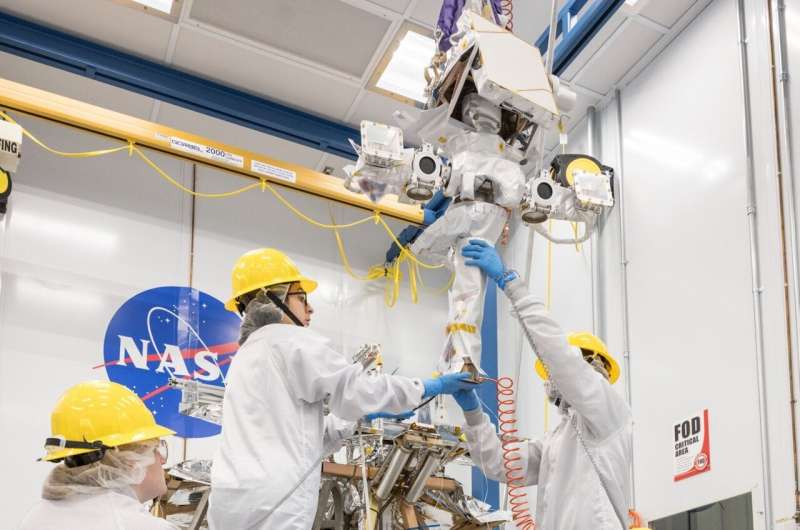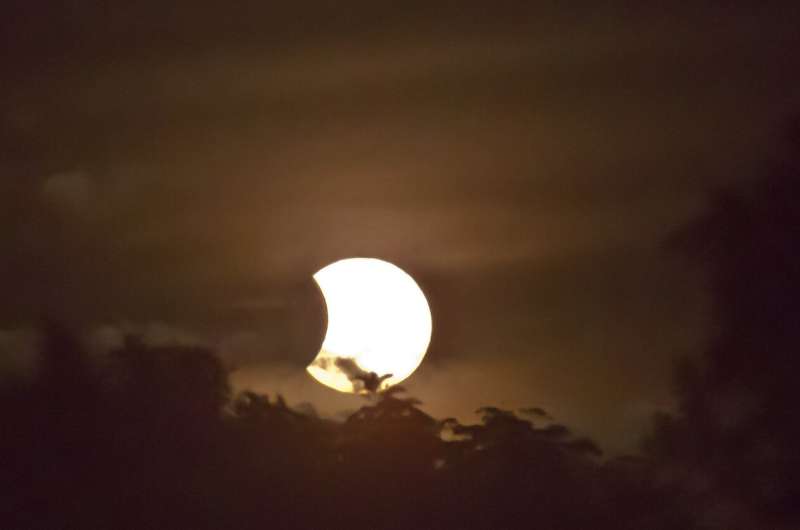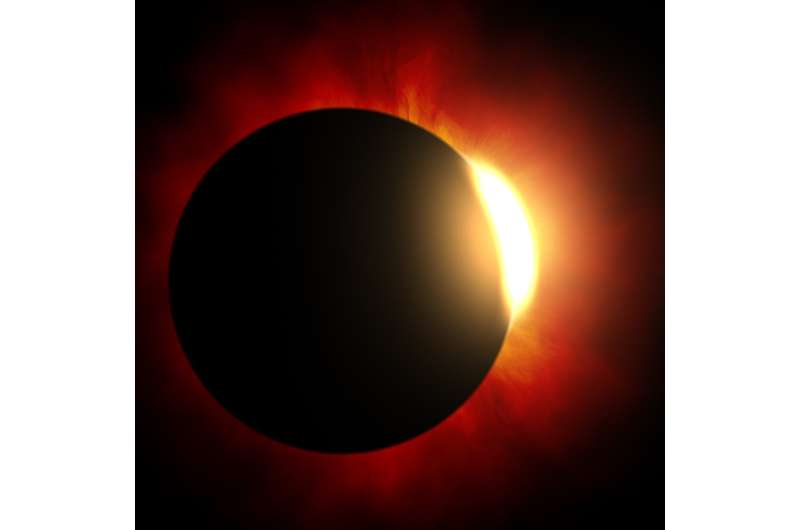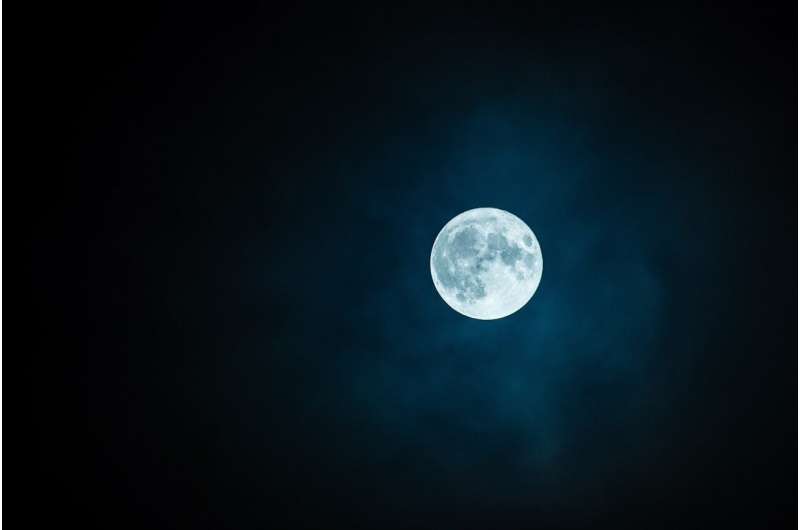Satellite terminal supplier CopaSAT storms into military market
Monday, 01 April 2024 19:13

NASA's VIPER robotic moon rover team raises its mighty mast
Monday, 01 April 2024 18:56
NASA's VIPER—short for the Volatiles Investigating Polar Exploration Rover—now stands taller and more capable than ever, thanks to its mast.
VIPER's mast, and the suite of instruments affixed to it, looks a lot like the rover's "neck" and "head." The mast instruments are designed to help the team of rover drivers and real-time scientists send commands and receive data while the rover navigates around hazardous crater slopes, boulders, and places that risk communications blackouts. The team will use these instruments, along with four science payloads, to scout the lunar South Pole.
The next total solar eclipse is in April: Here's what to know and where to see it
Monday, 01 April 2024 17:40
Don't be alarmed when the sky goes dark on April 8. A total solar eclipse will traverse North America, crossing Mexico, the United States, and Canada. This event will mark the only total solar eclipse visible from the United States until 2044. The full path of totality, as it's called, will begin on Mexico's Pacific Coast, cross northwestern Pennsylvania and New York state, and exit at the Atlantic Coast of Newfoundland, Canada.
A total solar eclipse occurs when the moon passes between the Earth and the sun, completely obscuring the sun from view. Those situated in the path of totality will see the moon fully cover the sun, the resulting shadow plunging the area into darkness during the day.
If the weather permits, spectators may also observe the "ring of fire," a term NASA uses to describe the stunning visual effect when the sun's outer atmosphere is visible as a luminous ring around the moon's silhouette against the darkened sky.
Here's what you need to know to experience this awe-inspiring event.
When is the next total solar eclipse?
The total solar eclipse will occur on April 8.
Tips to safely watch the total solar eclipse
Monday, 01 April 2024 15:47
On April 8, North America will experience a total solar eclipse, stretching across parts of Mexico, the U.S. and Canada, with approximately 31.6 million people living in the path of totality. According to NASA, every contiguous state in the U.S., along with parts of Alaska and Hawaii, will witness at least a partial solar eclipse.
With all eyes toward the sky during an eclipse, Dr. Dawn Davis, a dermatologist at Mayo Clinic, says it's important to protect your eyes and your skin from ultraviolet (UV) light damage. You'll need eye protection with special-purpose solar filters for viewing, and you should take precautions to safeguard your skin from the sun's rays during long periods outside.
And when it comes to protection, she says sunscreen is for the skin only—never for the eye itself.
A total solar eclipse is when the moon completely blocks the sun, temporarily darkening the sky. Looking directly at the sun can cause damage to the retina due to the strong amount of UV light.
"If you would like to see the solar eclipse, you will need to have special solar eclipse glasses," says Dr.
Foust Forward | The role of a reluctant regulator in space sustainability
Monday, 01 April 2024 13:30

Parsons to be system integrator for TraCSS space traffic coordination system
Monday, 01 April 2024 10:18

Japan moon probe put to sleep again
Monday, 01 April 2024 07:28
Japan's valiant moon lander was put to sleep again after unexpectedly surviving its second ultra-chilly long lunar night, the space agency said Monday.
The Smart Lander for Investigating Moon (SLIM)—dubbed the "Moon Sniper" for its landing precision—touched down in January, making Japan only the fifth nation to achieve a soft lunar landing.
But the unmanned lightweight spacecraft, carrying a mini-rover that moves like a turtle, landed at a wonky angle that left its solar panels facing the wrong way.
Defying pessimistic predictions, the probe was revived in late February once the lunar night—which lasts about 14 Earth days—ended.
Despite facing temperatures as low as -130 degrees Celsius (-200 degrees Fahrenheit), it repeated the feat last week and transmitted new images back to Earth.
On Monday, the Japan Aerospace Exploration Agency (JAXA) announced the probe has been put back to sleep again on Sunday.
"During this operation, we mainly checked the status of several devices by turning on switches and applying loads," JAXA said on social media platform X.
"Although there are some malfunctions in some functions of MBC, it still works, so we are carefully checking its status," it said, referring to the Multi-band Camera used to examine lunar rocks.
SpaceX launches Eutelsat 36D, lands booster on seventh reuse anniversary
Sunday, 31 March 2024 21:03

SpaceX sends Eutelsat telecom satellite into orbit
Sunday, 31 March 2024 16:31 SpaceX on Saturday launched a Falcon9 rocket supporting the Eutelstat 36D mission from the Kennedy Space Center in Florida.
The rocket took off at 5:52 p.m. EST, right at the open of a two-hour time window SpaceX had previously given for launch.
The payload is a Eutelsat 36D geostationary telecommunications satellite, which is designed to provide TV broadcasting and government se
SpaceX on Saturday launched a Falcon9 rocket supporting the Eutelstat 36D mission from the Kennedy Space Center in Florida.
The rocket took off at 5:52 p.m. EST, right at the open of a two-hour time window SpaceX had previously given for launch.
The payload is a Eutelsat 36D geostationary telecommunications satellite, which is designed to provide TV broadcasting and government se Mars Express achieves 25,000 orbits
Saturday, 30 March 2024 23:14 Celebrating a significant milestone, ESA's Mars Express has completed its 25,000th orbit around Mars, capturing yet another breathtaking view of the Red Planet to commemorate this achievement. The latest image, taken from a high altitude by the High Resolution Stereo Camera (HRSC), showcases the vast Tharsis region, known for hosting Mars's most colossal volcanoes, and features a surprise appear
Celebrating a significant milestone, ESA's Mars Express has completed its 25,000th orbit around Mars, capturing yet another breathtaking view of the Red Planet to commemorate this achievement. The latest image, taken from a high altitude by the High Resolution Stereo Camera (HRSC), showcases the vast Tharsis region, known for hosting Mars's most colossal volcanoes, and features a surprise appear Solar probe captures turbulence phenomenon in Sun's atmosphere for the first time
Saturday, 30 March 2024 23:14 For the first time, the Wide-field Imager for Parker Solar Probe (WISPR), operated by the U.S. Naval Research Laboratory (NRL), has documented the formation of turbulence within solar transients, marking a significant breakthrough in solar physics. This discovery, detailed in the Astrophysical Journal, was made possible by the WISPR instrument aboard NASA's Parker Solar Probe (PSP), highlighting
For the first time, the Wide-field Imager for Parker Solar Probe (WISPR), operated by the U.S. Naval Research Laboratory (NRL), has documented the formation of turbulence within solar transients, marking a significant breakthrough in solar physics. This discovery, detailed in the Astrophysical Journal, was made possible by the WISPR instrument aboard NASA's Parker Solar Probe (PSP), highlighting Spiral magnetic fields observed around Milky Way's central black hole
Saturday, 30 March 2024 23:14 In a groundbreaking study, the Event Horizon Telescope (EHT) team has provided new insights into the complex environment surrounding the Milky Way's supermassive black hole, Sagittarius A* (Sgr A*), located 27,000 light-years from Earth. This latest research unveils images of spiral magnetic fields encircling Sgr A*, a phenomenon previously observed in the larger M87* black hole, suggesting pote
In a groundbreaking study, the Event Horizon Telescope (EHT) team has provided new insights into the complex environment surrounding the Milky Way's supermassive black hole, Sagittarius A* (Sgr A*), located 27,000 light-years from Earth. This latest research unveils images of spiral magnetic fields encircling Sgr A*, a phenomenon previously observed in the larger M87* black hole, suggesting pote China advances space capabilities with latest multirole satellite launch
Saturday, 30 March 2024 23:14 In a significant advancement of China's space endeavors, the China Aerospace Science and Technology Corporation (CASC) successfully launched the Yunhai 3B satellite into orbit using the Long March 6A carrier rocket. The launch occurred at the Taiyuan Satellite Launch Center in Shanxi province at 6:51 am on Wednesday, marking a notable achievement in the country's space mission portfolio.
T
In a significant advancement of China's space endeavors, the China Aerospace Science and Technology Corporation (CASC) successfully launched the Yunhai 3B satellite into orbit using the Long March 6A carrier rocket. The launch occurred at the Taiyuan Satellite Launch Center in Shanxi province at 6:51 am on Wednesday, marking a notable achievement in the country's space mission portfolio.
T ESA CubeSat will probe asteroid with radar as part of Hera mission
Saturday, 30 March 2024 23:14 The European Space Agency (ESA) has embarked on a groundbreaking mission with the unveiling of the Juventas CubeSat, a compact spacecraft integral to the Hera mission aimed at exploring the Didymos binary asteroid system. This pioneering endeavor will mark the first radar investigation within an asteroid, focusing on the Dimorphos moonlet, comparable in size to the Great Pyramid.
Michael K
The European Space Agency (ESA) has embarked on a groundbreaking mission with the unveiling of the Juventas CubeSat, a compact spacecraft integral to the Hera mission aimed at exploring the Didymos binary asteroid system. This pioneering endeavor will mark the first radar investigation within an asteroid, focusing on the Dimorphos moonlet, comparable in size to the Great Pyramid.
Michael K 


